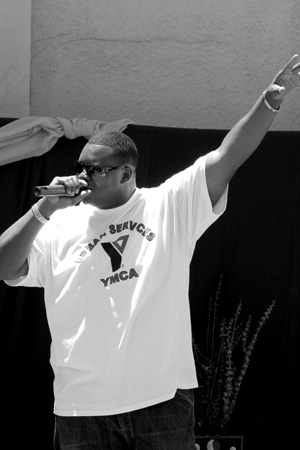Oakland, California is a small city filled with diversity and a powerful history that continues to unfold in surprising ways. The “not guilty” George Zimmerman trial verdict left many Oakland residents angry, and some even took to the streets to join protests, a few of which ended in vandalism. I recently spoke to my pastor Larry Austin about life in Oakland, what led to the riots, and how his faith in Christ gives him a new perspective on the events.
Jana Melpolder: What were your thoughts on the recent riots in Oakland? Did you think the media blew them out of proportion?

Pastor Larry Austin: No. We had a tragic situation happen: the loss of life. This is not new, right? So the riots are really a result of continuous oppression. Injustice had been done. It’s ironic that the day or the weeks within the riot the Fruitvale movie comes out. On the human level it’s like: that’s what people do in oppression. People speak up. You’re not going to take it. It’s never good. A lot of times we all wind up suffering because of hurt and this anguish and this pain.
I just think on the human level, I get it. I’m not joining in but at the same time I understand that hurt when you’re crying out and you don’t feel like anybody can hear you.
JM: How does your Christian faith affect what you thought of with the Trayvon Martin tragedy and George Zimmerman trial?
This is where our society is rife for the truth of the gospel. I get both sides of the Trayvon situation [and it’s a] loss of life. Nobody really knows all of the factors. What was really going on? That was tragic.
But then when I look at [the death of] Jesus, that was tragic. [And to] Trayvon…[Jesus] will right that wrong later on.
I look at the other side of it with Zimmerman. My natural side of it says, ‘I want justice for Trayvon, too’. When I start thinking about justice, which is ‘get what you deserve’, [I’d tell myself] ‘now don’t talk too fast. Do you want to get what you deserve? You have done some stuff, too.’
I can’t clamour for justice too strongly because I understand that [Jesus] was treated unjustly so that I, who am unjust, will be treated with this fairness from God, this mercy.
JM: This message of not judging Zimmerman because we ourselves have sinned is powerful. How can Oakland heal from the pain of the Zimmerman verdict?
I feel the hurt, the pain, the anguish, but I also feel like this is why the gospel is important. Only the gospel can speak to a situation that can make you pump your breaks and be like, ‘hold on a second.’ Zimmerman is going to be hated. What kind of future is that? That’s just tough every way you look at it.
Let’s protest rightly, let’s speak to the powers that be, but let’s preach the gospel, because the [protests] are going to keep happening. Our world is broken [and] we can’t fix it with just arguing with people or arguing against systems. Something different [needs to] be put in place, and only Christ can put that in place.
